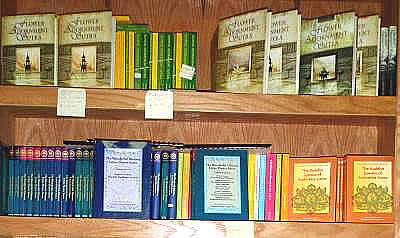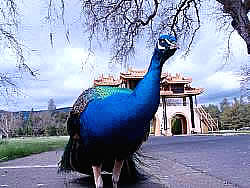 |
|
My Experiences at CTTB
From the February 2003 issue of Vajra Bodhi Sea
Spoken by Lori Cabansag in the Buddha Hall, CTTB in the evening of Saturday, May 25, 2002venerable Master, Dharma Masters, and All Good Knowing Advisors, Amitabha Buddha. My name is Lori Cabansag, Dharma name Qin Rui. I took refuge at the City of Ten Thousand Buddhas (CTTB) on May 31, 1998 and I took the Five Precepts at CTTB in 1999. It’s my turn tonight to speak. My ethic background is Filipino, so I don’t speak Chinese. I’m working on it, though. I hope you will be patient with me. This is probably as far as I should translate for myself.
I’ve been living here at the City of Ten Thousand Buddhas for ten months. I’d like to share my impressions about living at CTTB. Most of you have been here much longer than I have. If I say anything inaccurate, please correct me.
Next week is my birthday-my four year anniversary, that is, of having taken refuge with the Triple Jewel. Before coming here, I was living in San Francisco and teaching ESL at a community college. I’d spend all day at Gold Mountain Monastery on weekends, attending ceremonies, cleaning, talking to visitors, and so on. Spending all this time at a Buddhist monastery wasn’t something that my Roman Catholic family could easily understand or accept. I myself didn’t understand why I felt so strongly drawn there. I didn’t know how to explain it to myself until after I came to CTTB.
Being at Gold Mountain Monastery was like a glass of ice water to a tired desert wanderer. The Dharma Masters and laypeople served up this cool refreshing drink-it was the teachings of the Buddha. By their instructions and by their example and through reading Sutras and the Venerable Master’s commentaries, I learned what I could of the principles taught by the Buddha, the right ways of acting in a monastery, and other things. I’m still learning, of course, so if you see me making any mistakes, please let me know.

An analogy the Venerable Master often uses is : “metal fillings to a magnet.” That’s how strongly I was drawn to Buddhism. The pull was so strong that I wanted nothing but to live full-time in a monastic community.
At first, I thought I would spend most of my time studying the Sutras, meditating, and attending ceremonies. I thought I would leave the everyday world of work and routine behind. Soon, I realized that ‘work’ would take up most of my time, and that ‘work’ could be an integral part of Buddhist practice.
Not only am I still an ESL teacher, but I’m using old work skills...and I’ve picked up new ones, like... and copy-editing. I never would have imagined I’d be doing these things as part of my religious practice, but it’s all very instructive. I really have to thank my co-workers for all their patience with me.
Friends back home have said: “You left your old job in San Francisco to do the same job teaching full time…You don’t have any free time!” So, just how is “work” a part of Buddhist practice? The key, I think, is in the practice of being mindful. To be mindful at all times no matter what I’m doing, that is the real work.
What people back home don’t know is that I need the work as much as the work needs me. I need it to help me overcome my bad habits of selfishness and laziness. And it helps me practice to be more mindful. But balance is important, too. Everyday I have to try to balance work, study, personal business, and attending ceremonies. And at all times I try to be aware of my thoughts, to be in control of them, and to do my best.
Last year, before I came here to live, I was told that everyone here lives very close to nature. This means living closer to the elements and with fewer luxuries. For me, living close to nature has meant close contact with all kinds of creatures-animals of various sorts.

I arrived last summer, and besides the peacocks, the flies in the summertime were the first creatures I noticed. In the Buddhahall, there were so many flies. They seemed greedy to feel the sensation of every cultivator’s head with their feet. The feel of one head wasn’t enough. They had to land on the heads of each and everyone, left-home and lay people alike. Isn’t living outside of here like that too? With the influence of advertising and popular culture, it’s easier for me to feel greedy for different things, for different sensations, like I always want to try something more.
In the fall, the weather was warm enough still for windows to be kept open. One day, a hummingbird flew into the classroom and trapped itself between two windowpanes. I pulled on its beak and cupped it with my hand to try to free it. Even after it found the way out, I could still feel its tiny, delicate body on my hands.
In winter, the heavy rains brought out the earthworms. If I hadn’t been looking, I would have squashed many of them. There was even one slithering through the hallway in the women’s dorm.
Once, in the dining hall, I almost stepped on a greenish-gray frog about two inches long that was squatting near the steps between the kitchen and the small dining hall. I had to pick it up to take it outside, but it sure did put up a fight. It strained its head and body to try to slip through my fingers. He was a clammy one.
A couple weeks ago, I walked into the teacher’s office at school and there was a scrub jay on the desk next to mine. And last week a strange shuffling, whirring sound woke me up at three o’clock in the morning. I couldn’t see what it was, but it sounded like something big. I turned on the light-where was that sound coming from? It was a bat that had flown through my open window! I was a bit unnerved to be sharing a room with a bat, but fortunately I opened the window wider and it flew out.
I’ve had many other close encounters with animals here. Some have to be picked up and moved to a safer place. Others need to be shown the way out, and they need to be guided in the right direction. These encounters make me think, among other things, of our own relationship to the Buddhas and Bodhisattvas. As Buddhists, we seek the guidance and wisdom of our teacher, the Venerable Master. We need to be shown the way or the methods, to get out of the desert of suffering, the tiring, endless cycle of birth and death.
The City of the 10,000 Buddhas has many treasures-such as the intangible, but real, presence of the Masters, the Sutras, and the Sangha. And everyone here is of like mind; we want to purify our minds and our hearts, gain wisdom, and deepen our compassion for others. So being here at the City to cultivate is ideal. I feel very fortunate and grateful to be here. May we all soon realize the Buddha’s Way. Amitabha.


